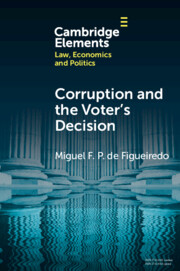470 results
35 - Guarantor (or the So-called “Fourth Branch”) Institutions
- from Part III. A - The State
-
-
- Book:
- The Cambridge Handbook of Constitutional Theory
- Published online:
- 27 March 2025
- Print publication:
- 24 April 2025, pp 603-621
-
- Chapter
- Export citation
27 - Regulation
- from Part II - Modalities
-
-
- Book:
- The Cambridge Handbook of Constitutional Theory
- Published online:
- 27 March 2025
- Print publication:
- 24 April 2025, pp 451-469
-
- Chapter
- Export citation
4 - Judging in Conflict
-
- Book:
- Political Theology and the Conflicts of Democracy
- Published online:
- 21 March 2025
- Print publication:
- 03 April 2025, pp 206-279
-
- Chapter
- Export citation
9 - Towards a Framework for Technological Governance
- from Part III - Political and Managerial Controls
-
- Book:
- Combatting the Code
- Published online:
- 26 March 2025
- Print publication:
- 03 April 2025, pp 183-223
-
- Chapter
- Export citation
Separating real incentives and accountability
-
- Journal:
- Experimental Economics / Volume 14 / Issue 4 / November 2011
- Published online by Cambridge University Press:
- 14 March 2025, pp. 507-518
-
- Article
- Export citation
Introduction
-
- Journal:
- Asia-Pacific Journal / Volume 19 / Issue 17 / September 2021
- Published online by Cambridge University Press:
- 14 March 2025, e2
-
- Article
- Export citation
Absence: Electoral Cycles and Teacher Absenteeism in India
-
- Journal:
- British Journal of Political Science / Volume 55 / 2025
- Published online by Cambridge University Press:
- 10 March 2025, e38
-
- Article
-
- You have access
- Open access
- HTML
- Export citation
7 - AI Meets the GDPR
- from Part II - AI, Law and Policy
-
-
- Book:
- The Cambridge Handbook of the Law, Ethics and Policy of Artificial Intelligence
- Published online:
- 06 February 2025
- Print publication:
- 13 February 2025, pp 133-157
-
- Chapter
-
- You have access
- Open access
- HTML
- Export citation
Conditional Populist Party Support: The Role of Dissatisfaction and Incumbency
-
- Journal:
- Latin American Research Review ,
- Published online by Cambridge University Press:
- 03 February 2025, pp. 1-20
-
- Article
-
- You have access
- Open access
- HTML
- Export citation
7 - The Visibility and Accountability of Political Power
- from Part II - The Emergence of the Epistemological Constitution of Modern Democracy
-
- Book:
- Can Democracy Recover?
- Published online:
- 02 January 2025
- Print publication:
- 16 January 2025, pp 77-81
-
- Chapter
- Export citation
Response to critics of Open and Inclusive: Fair Processes for Financing Universal Health Coverage
-
- Journal:
- Health Economics, Policy and Law , First View
- Published online by Cambridge University Press:
- 13 January 2025, pp. 1-13
-
- Article
-
- You have access
- Open access
- HTML
- Export citation
Oversight of the Legal System in an Authoritarian Regime: Police and Court Monitoring in Russia
-
- Journal:
- Journal of Law and Courts ,
- Published online by Cambridge University Press:
- 10 January 2025, pp. 1-25
-
- Article
-
- You have access
- Open access
- HTML
- Export citation
13 - UNHCR and Biometrics
- from Part III - Public Territories and Private Borders: Tracing Transnational Power Relations
-
-
- Book:
- Lawless Zones, Rightless Subjects
- Published online:
- 02 January 2025
- Print publication:
- 09 January 2025, pp 228-244
-
- Chapter
-
- You have access
- Open access
- HTML
- Export citation

Corruption and the Voter's Decision
- Experimental Evidence from Brazil
-
- Published online:
- 07 January 2025
- Print publication:
- 03 April 2025
-
- Element
- Export citation
Précis of Open and Inclusive: Fair Processes for Financing Universal Health Coverage
-
- Journal:
- Health Economics, Policy and Law , First View
- Published online by Cambridge University Press:
- 07 January 2025, pp. 1-5
-
- Article
-
- You have access
- Open access
- HTML
- Export citation
8 - Decolonial Feminist Peacemaking
- from Part III - Subjects
-
- Book:
- The Politics of Women, Peace, and Security in UN Mediation
- Published online:
- 19 December 2024
- Print publication:
- 02 January 2025, pp 183-198
-
- Chapter
- Export citation
8 - The Politics of Wartime Displacement
-
- Book:
- Guilt by Location
- Published online:
- 12 December 2024
- Print publication:
- 19 December 2024, pp 238-260
-
- Chapter
- Export citation
11 - Fundraising in Fiji: Taxation, Proceduralism, and a Moral Economy of Accountability
-
-
- Book:
- Anthropology and Tax
- Published online:
- 12 December 2024
- Print publication:
- 19 December 2024, pp 263-283
-
- Chapter
-
- You have access
- Open access
- HTML
- Export citation
5 - Complementarity, Structure, and Ambivalence
- from Part II - Remedies beyond the CJEU
-
-
- Book:
- Redressing Fundamental Rights Violations by the EU
- Published online:
- 21 December 2024
- Print publication:
- 12 December 2024, pp 123-154
-
- Chapter
-
- You have access
- Open access
- HTML
- Export citation
Artificial intelligence at the bench: Legal and ethical challenges of informing—or misinforming—judicial decision-making through generative AI
- Part of
-
- Journal:
- Data & Policy / Volume 6 / 2024
- Published online by Cambridge University Press:
- 02 December 2024, e59
-
- Article
-
- You have access
- Open access
- HTML
- Export citation


